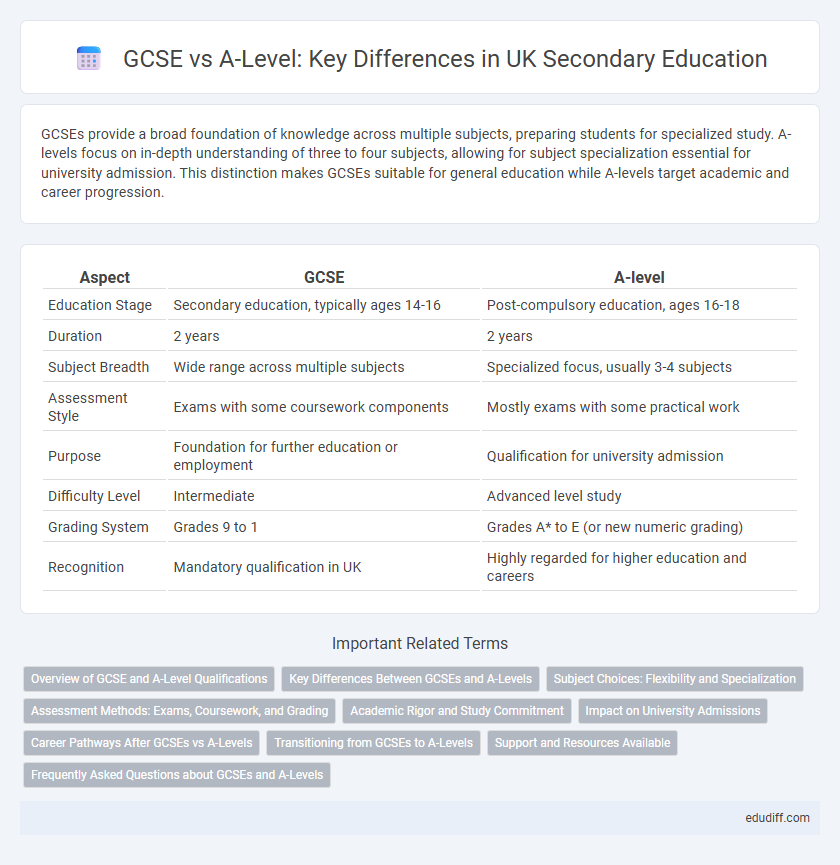GCSEs provide a broad foundation of knowledge across multiple subjects, preparing students for specialized study. A-levels focus on in-depth understanding of three to four subjects, allowing for subject specialization essential for university admission. This distinction makes GCSEs suitable for general education while A-levels target academic and career progression.
Table of Comparison
| Aspect | GCSE | A-level |
|---|---|---|
| Education Stage | Secondary education, typically ages 14-16 | Post-compulsory education, ages 16-18 |
| Duration | 2 years | 2 years |
| Subject Breadth | Wide range across multiple subjects | Specialized focus, usually 3-4 subjects |
| Assessment Style | Exams with some coursework components | Mostly exams with some practical work |
| Purpose | Foundation for further education or employment | Qualification for university admission |
| Difficulty Level | Intermediate | Advanced level study |
| Grading System | Grades 9 to 1 | Grades A* to E (or new numeric grading) |
| Recognition | Mandatory qualification in UK | Highly regarded for higher education and careers |
Overview of GCSE and A-Level Qualifications
GCSE qualifications serve as the foundational academic benchmark for students aged 14 to 16 in the UK, covering core subjects like English, Mathematics, and Science. A-Level qualifications, typically taken between ages 16 to 18, offer specialized study in subjects that prepare students for university admission and advanced career pathways. Both qualifications are assessed through a combination of coursework and exams, with A-Levels providing greater depth and subject rigor compared to GCSEs.
Key Differences Between GCSEs and A-Levels
GCSEs primarily assess foundational knowledge across a broad range of subjects, while A-Levels focus on in-depth study of fewer subjects, preparing students for university education. GCSE grading uses a scale from 9 to 1, whereas A-Levels are graded from A* to E, reflecting higher academic demands. The typical study duration for GCSEs is two years starting at age 14, whereas A-Levels usually span two years post-GCSE, beginning at age 16.
Subject Choices: Flexibility and Specialization
GCSEs offer broad subject choices allowing students to explore multiple disciplines, fostering a well-rounded educational foundation. In contrast, A-levels emphasize specialization by enabling students to concentrate on three to four subjects, aligning with their future academic or career goals. This flexibility at GCSE level supports informed decision-making for focused A-level study pathways.
Assessment Methods: Exams, Coursework, and Grading
GCSE assessment primarily involves a combination of final exams and coursework, with grading based on letter grades from 9 to 1, emphasizing knowledge recall and application. A-levels focus more on exams spread across two years, with less coursework, using letter grades from A* to E to evaluate deeper analytical and extended writing skills. Both systems employ standardized marking schemes, but A-levels typically require higher-order thinking and in-depth subject understanding.
Academic Rigor and Study Commitment
A-level courses demand higher academic rigor compared to GCSEs, requiring in-depth understanding and critical analysis of subjects. Students engage in extended independent study, reflecting a significant increase in study commitment and time management skills. The transition from GCSE to A-level marks a pivotal step in preparing for university-level education and specialized career paths.
Impact on University Admissions
Universities often prioritize A-level qualifications over GCSEs when assessing student readiness due to the increased specialization and depth of study in A-level courses. Performance in relevant A-level subjects directly influences admission decisions, with many programs requiring specific grades to meet entry criteria. While GCSE results provide a foundational academic profile, A-level achievements typically carry greater weight in competitive university admissions processes.
Career Pathways After GCSEs vs A-Levels
A-levels provide specialized subject knowledge that aligns directly with university courses and professional career pathways, enhancing opportunities in fields such as medicine, engineering, and law. GCSEs offer a broad academic foundation across multiple subjects, useful for identifying interests but often require progression to A-levels or vocational qualifications for competitive career entry. Employers and higher education institutions typically value A-level qualifications more highly for advanced roles and degree programs.
Transitioning from GCSEs to A-Levels
Transitioning from GCSEs to A-Levels involves adjusting to increased subject specialization and deeper academic rigor, requiring enhanced independent study skills and time management. Students often experience a shift from broad foundational knowledge to in-depth content mastery in chosen subjects such as Mathematics, Biology, or History. Effective preparation includes familiarizing oneself with exam board specifications like AQA or Edexcel to meet assessment objectives successfully.
Support and Resources Available
GCSE students benefit from structured revision guides, interactive online platforms like BBC Bitesize, and extensive workbook resources tailored to foundational subjects. A-level learners have access to advanced textbooks, past papers, and university-style tutoring sessions that deepen subject understanding and exam techniques. Both levels receive dedicated teacher support, but A-levels often provide more specialized mentoring through workshops and subject-specific forums.
Frequently Asked Questions about GCSEs and A-Levels
GCSEs assess broad foundational knowledge typically taken at age 16, while A-Levels offer specialized study for students aged 16-18, influencing university admissions and career paths. Common questions include differences in grading systems, subject choices, and exam formats, with A-Levels often requiring deeper analytical skills and extended coursework. Understanding these distinctions helps students and parents make informed decisions about academic progression and future opportunities.
GCSE vs A-level Infographic

 edudiff.com
edudiff.com